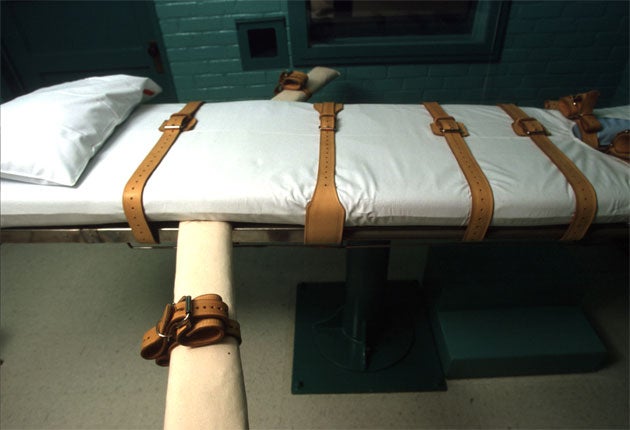Your support helps us to tell the story
From reproductive rights to climate change to Big Tech, The Independent is on the ground when the story is developing. Whether it's investigating the financials of Elon Musk's pro-Trump PAC or producing our latest documentary, 'The A Word', which shines a light on the American women fighting for reproductive rights, we know how important it is to parse out the facts from the messaging.
At such a critical moment in US history, we need reporters on the ground. Your donation allows us to keep sending journalists to speak to both sides of the story.
The Independent is trusted by Americans across the entire political spectrum. And unlike many other quality news outlets, we choose not to lock Americans out of our reporting and analysis with paywalls. We believe quality journalism should be available to everyone, paid for by those who can afford it.
Your support makes all the difference.Three prisoners were executed in the space of 24 hours in the US this week. The grim spectacle came after a seven week hiatus prompted by the horribly botched execution of Clayton Lockett in Oklahoma in April.
Clayton Lockett’s execution took nearly two hours. According to the execution team’s official log of the incident, they spent over 45 minutes trying to insert the needle, repeatedly puncturing his arms, legs and neck; eventually, they ‘went to the groin’.
Having inserted the needle, they began to administer the lethal cocktail. But something went wrong. After 94 minutes, Clayton Lockett’s heart was still beating. There were no drugs left. Eventually, the Director called off the execution. Clayton was left to die of a heart attack behind the curtain.
The torturous execution of Clayton Lockett has garnered criticism from around the world, and rightly so. But it was not the first botched lethal injection the US had seen, and if this week is anything to go by, it certainly won’t be the last.
The three executions which were rushed through in Florida, Missouri and Georgia this week were shrouded in secrecy. Like in Oklahoma, all three states refused to disclose any information on either the source or quality of the drugs used in this week’s executions.
Why? The states’ argument is that they are "protecting" the identity of the manufacturer or maker of the drugs used in the execution; that if their identities were to be revealed, they would no longer want to provide execution drugs to the prisons.
The reality, of course, is that the drug-makers have never wanted to see medicines which they developed to save the lives of patients used to end the lives of prisoners in potentially torturous executions.
When the pharmaceutical company Lundbeck put controls in place to prevent prisons from purchasing pentobarbital for use in executions, the Ohio Department of Corrections tried to bypass the controls by ordering drugs through the Ohio Department of Mental Health. One official wrote to another: “When you call them to see if they will sell to us make sure you say we are the Department of Mental Health do not mention anything about corrections in the phone call or what we use the drug for.”
When Texas wanted to buy drugs from a compounding pharmacy in New York, they didn’t disclose the purpose of the purchase; when the pharmacist was alerted to the fact that the drugs were to be used to kill prisoners, he “cancelled the order before it had been filled.”
I’ve worked with scores of manufacturers and pharmacists over the years. None of them want to provide drugs for executions. They are not asking for secrecy, for their identities to be hidden; they are asking simply for their repeated calls for US prisons not to use their drugs to kill prisoners to be heeded.
Clayton Lockett’s execution shocked the world. And, like Dennis McGuire’s botched execution before it, went some way to debunking the myth of the ‘humane’ lethal injection. For a moment, the medical veil was lifted, and we were allowed to glimpse the horror of what goes on behind the curtain of the execution chamber.
Even state officials have been forced to acknowledge that these executions didn’t go to plan. But instead of shining a light onto the cracked and creaking machinery of death responsible for these botched executions, they are drawing an even heavier curtain of secrecy across the chamber, all the while rushing more prisoners to the gallows.
In the seminal US Supreme Court case of Baze v Rees, Justice Roberts wrote that since the death penalty is constitutional, there must be a way to carry it out. Recent events invite us to view this statement differently: if states cannot carry it out in a constitutional way, can the death penalty be constitutional?
Maya Foa works at legal charity Reprieve on lethal injection issues. She consults with pharmaceutical companies who wish to put controls in place to ensure their drugs are not sold for use in executions; she also works with the European Commission and other governments on export controls to protect medicines from abuse in lethal injections.

Join our commenting forum
Join thought-provoking conversations, follow other Independent readers and see their replies
Comments